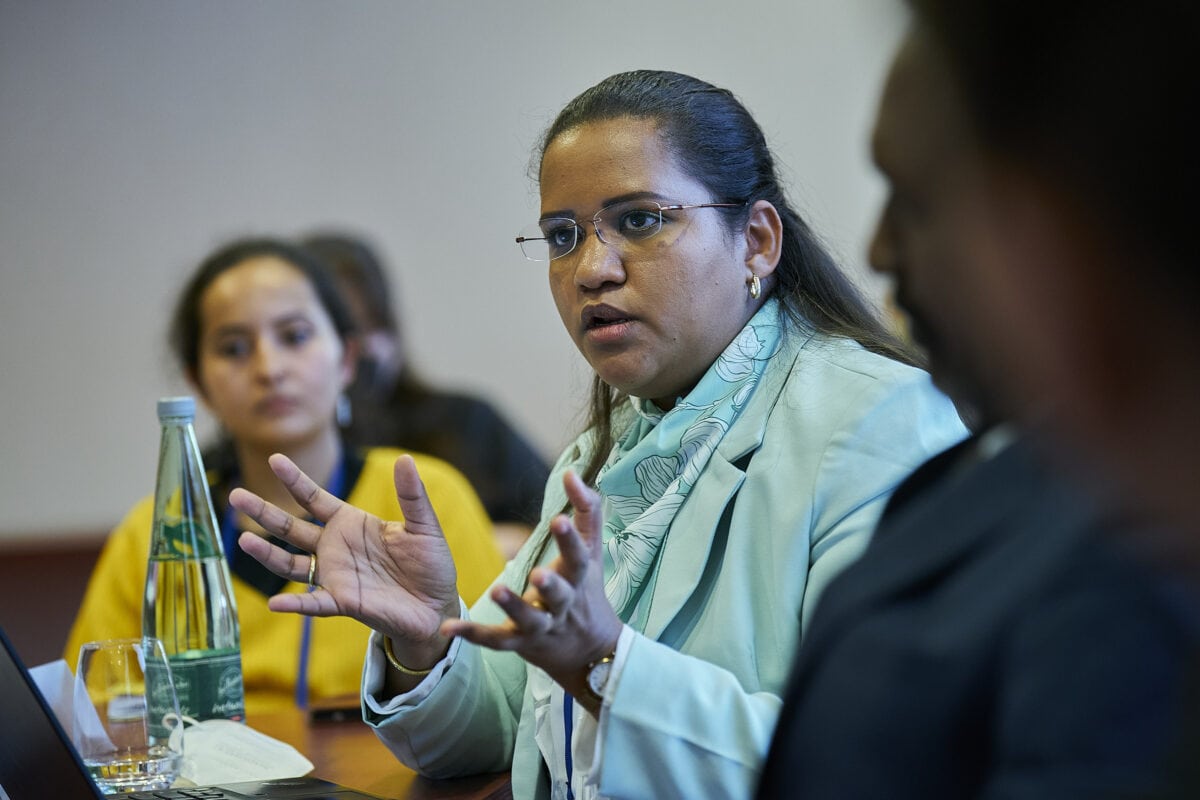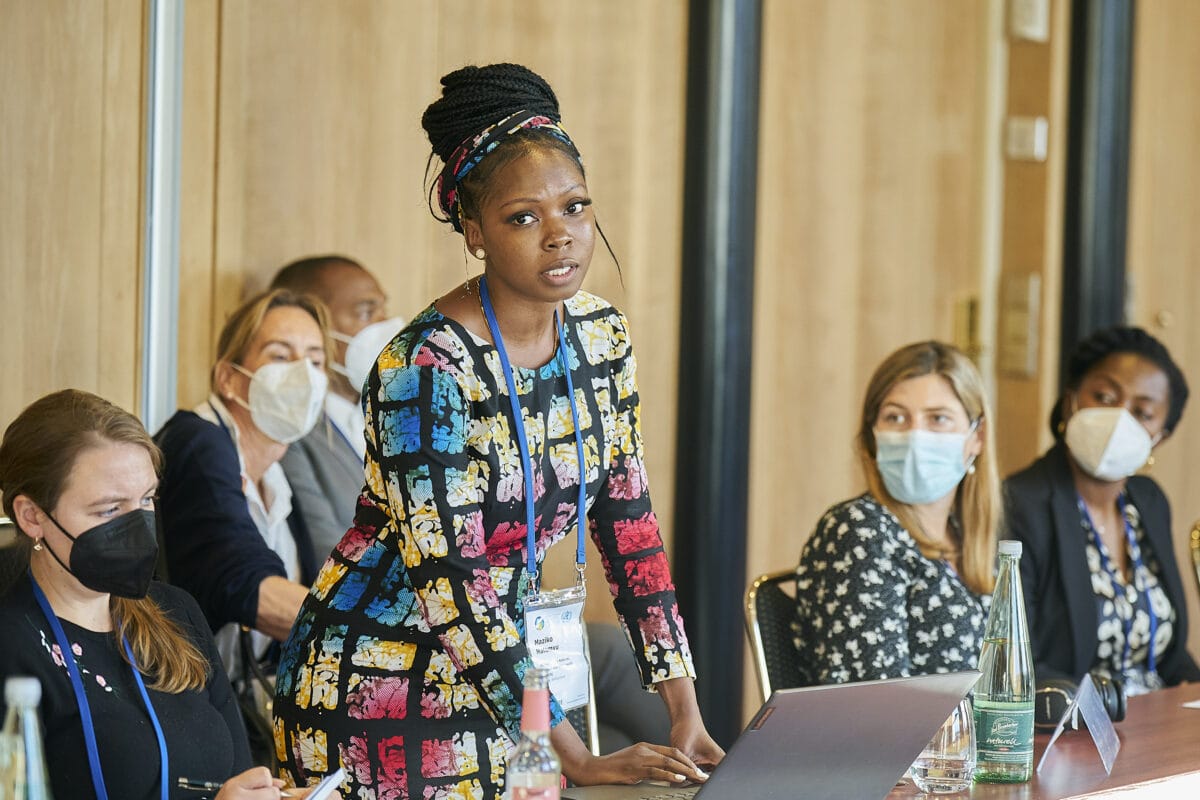Protecting mothers and newborns against the negative impacts of climate change
Caption: The roundtable was moderated by Maziko Matemvu, youth activist from Malawi. Copyright: GIZ/Steffen Kugler
Climate change is increasingly recognised as serious threat to human health with pregnant women and newborns amongst those most at risk. This, and how to mitigate the effects, was the topic of a roundtable discussion at the World Health Summit in Berlin in October 2022.
The event was co-organised by Germany’s Federal Ministry for Economic Cooperation and Development (BMZ), Deutsche Gesellschaft für Internationale Zusammenarbeit (GIZ), United Nations Population Fund (UNFPA) and World Health Organization (WHO) .
250,000 additional deaths per year due to climate change
In his opening remarks, Dr Anshu Banerjee, Director for Maternal, Newborn, Child and Adolescent and Ageing at WHO, explained how rising temperatures, air pollution, and shortage of food and water due to climate change negatively affect maternal and newborn health – and may in turn threaten hard-won gains to reduce morbidity and mortality: ‘Between 2030 and 2050, climate change is expected to cause approximately 250,000 additional deaths per year from malnutrition, malaria, diarrhea and heat stress alone.’, said Dr Banerjee.
Effects are both direct and indirect
The effects are both direct and indirect: For example, evidence presented by Dr Veronique Filippi from the London School of Hygiene and Tropical Medicine shows that exposure to high temperatures increases the risk of complications in pregnancy as well as the risk of premature birth, foetal abnormalities, and stillbirth. Climate change also indirectly affects maternal and newborn health via increases in diseases such as malaria and dengue fever due to changes in temperatures and rainfall patterns.
Persisting gender inequalities exacerbate these risks. Women work more frequently in situations where there is little protection, such as subsistence agriculture, and have less access to finance. Because of their caretaking responsibilities, women are often bound to their home regions. They have fewer opportunities to move away from areas affected by droughts, flooding, or food and water insecurity.
Climate change aggravates gender inequalities
Dr Maliha Khan, CEO of Women Deliver, pointed out that the topic of discussion shows that those who contribute the least to climate change suffer the most from its effects. According to her, ‘the climate crisis reduces girls’ and women’s bodily autonomy as they cannot access sexual and reproductive health services, which in turn means they have less resilience to increasing climate shocks and stresses – we must step up and ensure climate resilient provision of sexual and reproductive health and rights for everyone’.

Togo builds climate resilience to protect women, newborns and children
To counter these effects, health programmes must build resilience against and awareness of the manifold consequences of climate change: The case of Togo shows how the Togolese Ministry of Health, with support from the GIZ project ProSanté, renders its health system more resilient to climate change induced illnesses such as malaria, meningitis, or diarrhoeal diseases, to which women, newborns, and children are particularly vulnerable. To facilitate the implementation of resilience measures, the Ministry of Health is currently working to access climate funding (watch this video to learn more). In other ministries, the topic is high on the agenda, too: Ms. Méry Yaou of the Togolese Ministry of the Environment and Forestry Resources points out why women need to be center stage when planning such measures:
In Sudan, water shortages hit facilities needed by women to deliver their babies
Climate-related environmental changes may also lead to increased food insecurity and water shortages. The latter is the case in Sudan, where currently almost 19 million people are affected by the lack of drinking water in health facilities. This number is expected to increase by 60% by 2030. Dr Dalya Eltayeb of the Ministry of Health of Sudan presented an analysis that was conducted with support from UNFPA to identify the most affected Emergency Obstetric and Neonatal Care facilities in order ensure long-term water supply (watch this video to learn more).

SRGR efforts must address the effects of climate change
‘Globally, climate change has negative effects on maternal and newborn health – directly and indirectly. We must urgently address the lasting effects of climate change on maternal and newborn health outcomes which is often overlooked in global climate discussions.’ said Dr Will Zeck of UNFPA.
The take home message was clear: Efforts to strengthen sexual and reproductive health and rights must increasingly consider climate-related effects on health as well as the particular vulnerabilities faced by women and girls.
December 2022

